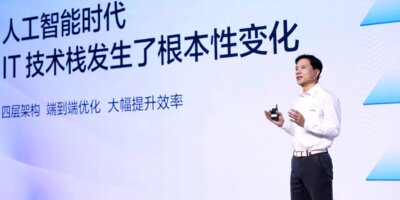
This picture shows the Ernie bot from China’s Baidu in Beijing on August 31, 2023. Baidu has now unveiled a newer version which it claims can rival ChatGPT. (Photo by WANG Zhao / AFP)
China’s Baidu chatbot updates bring it on par with ChatGPT
- Baidu claims its updated AI chatbot can rival ChatGPT.
- ERNIE 4.0 has capabilities to understand, generate, reason and memorize interactions with users.
- Baidu also unveiled several other generative AI innovations.
As OpenAI continues to improve and update ChatGPT, Chinese tech companies have also been working round the clock to develop their chatbots. While there are already several generative AI chatbots that have been unveiled by Chinese tech companies, none has been superior to Baidu’s ERNIE chatbot.
At the Baidu World 2023 technology conference in Beijing, the internet giant unveiled the newest version of its AI chatbot, ERNIE. What made the unveiling more exciting was that the company now claims that the updated chatbot is capable of matching the capabilities of the latest updates on ChatGPT.
“ERNIE 4.0 has achieved a full upgrade with drastically improved performance in understanding, generation, reasoning, and memory,” commented Robin Li, Co-founder, Chairman and CEO of Baidu.
“These four core capabilities form the foundation of AI-native applications and have now unleashed unlimited opportunities for new innovations,” said Li.
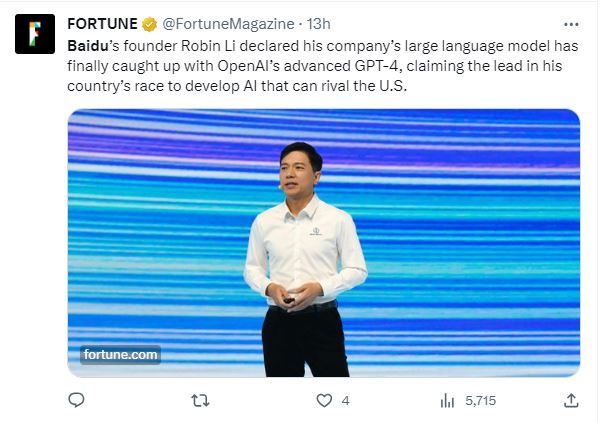
Can the Baidu Chatbot be better than ChatGPT?
In his keynote presentation, Li showcased the new ERNIE bot powered by ERNIE 4.0 through extensive demonstrations of its four core AI capabilities.
- Understand – The Baidu chatbot is able to understand and provide answers to complex and even disorganized human requests, as well as interpret hidden messages.
- Generate – Generates a range of content, including text, images, and videos, in just a few minutes, based on one simple text prompt and image input.
- Reason – The updated Baidu chatbot can apparently solve complex geometry problems.
- Memorize – The chatbot has a memory and integrates incremental inputs. This was demonstrated by writing a short story and regularly adding new information as ERNIE was in the process of writing the story.
Dr. Haifeng Wang, Chief Technology Officer of Baidu said that ERNIE 4.0 started beta version testing in September, based on a limited amount of user input, and has since seen its overall performance improve by almost 30%. While the previous version is available to the public, the new ERNIE 4.0 is now only accessible to invited users on ERNIE Bot. Dr. Wang added that the API will be available upon application to enterprise clients via the Qianfan Foundation model platform.
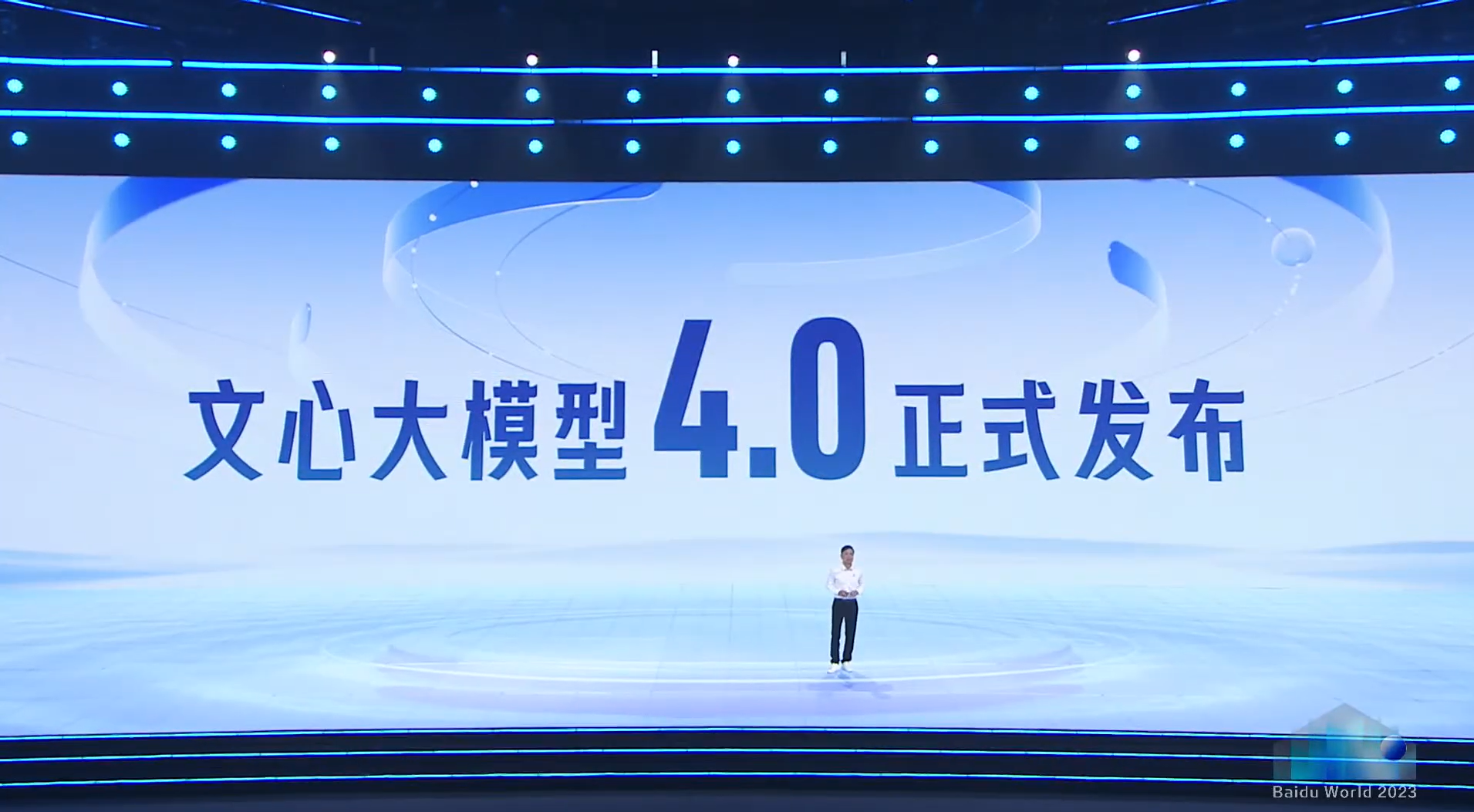
ERNIE 4.0 is the latest version from Baidu.
Similar but different: the Baidu chatbot and everything else
Apart from the chatbot, Baidu has been using foundation models and large language models (LLMs) on other applications, too. This includes innovations in updates to AI apps such as Baidu Search, Baidu GBI, Infoflow, Baidu Wenku, Baidu Drive and Baidu Maps. This revamp has not only significantly enhanced productivity, but has also sparked creativity, leading to delightful and diverse user interactions.
Most of these new updates have strong similarities to the updates announced by Microsoft, Google and OpenAI on their generative AI products as well.
For example, the new Baidu Search with the addition of generative AI has transformed the search experience, changing the way users engage with information and providing more in-depth information from a single search.
The new Baidu Search can now aggregate and summarize information from diverse web sources and present a consolidated answer through a variety of models, including text, image and dynamic graph, ensuring answers that are both vivid and concise. Sounds similar to the updates on Bing and Bard, right?
The updated version will also suggest more content streams that are relevant to previous requests, while staying highly customized based on the user’s unique profile. The interactive chat interface for more complex searches enables users to iteratively refine their queries until they reach the optimal answer, all in one search interface.
Meanwhile, Baidu GBI, which is also China’s first generative business intelligence solution, can quickly execute data inquiries, output business analytics, and deliver results through easy-to-understand text and graph summaries. It reduces the heavy lifting of having to go through multiple spreadsheets to retrieve and analyze data, drastically accelerating the process of business analytics and decision-making.
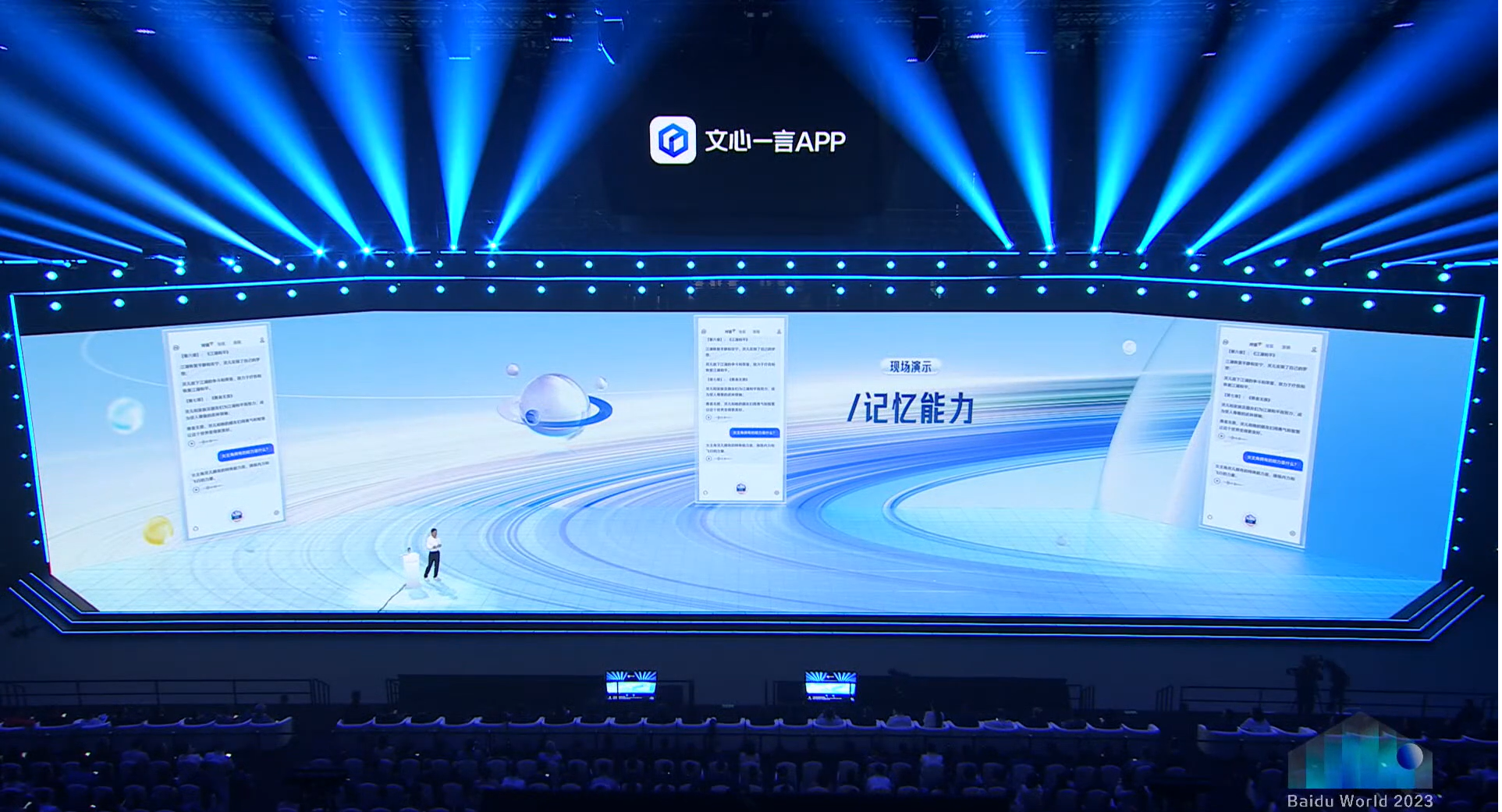
Robin Li, Co-founder, chairman and CEO of Baidu demonstrating the capabilities of the updated AI chatbot.
Another update is Infoflow, an intelligent workplace APP with a super assistant. Boosted with ERNIE’s AI capabilities, Infoflow can execute an array of office tasks through natural language processing – from orchestrating meeting agendas and summarizing key takeaways from complicated chat history to preparing meeting briefings based on users’ previous meeting documents and even securing flight bookings based on their agenda.
Then there’s Baidu Wenku. With foundation model capabilities, Baidu Wenku is a content productivity platform that can help users in conducting academic research, summarizing key information, creating documents, and generating slideshow presentations, drastically reducing the time spent in content production in scenarios such as preparing a keynote speech. Again, these innovations mirror those that have been announced by both Google and Microsoft.
Another innovation is the Baidu Drive YunYiduo. The world’s first cloud drive intelligent assistant users text prompts or voice prompts to retrieve files, images, videos, and more formats, even for very specific requests. Powered by its multi-modal capabilities, YunYiduo can summarize key information even from different figures appearing in a video, precisely pinpoint the exact frame in the video, render transcriptions, and add subtitles to drastically enhance users’ efficiency to extrapolate, summarize, and generate content across various media formats.
The new Baidu Maps integrated AI capabilities into its extensive functions, including navigation, ride-hailing, restaurant recommendations, hotel booking, and more. The newly integrated AI guide will take the initiative to suggest next step of action to users during their trip.… pic.twitter.com/OIvOyooRbP
— Baidu Inc. (@Baidu_Inc) October 18, 2023
Next, there is Baidu Maps, China’s version of Google Maps. Considered as the world’s first AI-native map product, Baidu Maps integrates AI capabilities into its extensive functions, including navigation, ride-hailing, restaurant recommendations, hotel booking, and more. The newly integrated AI guide will take the initiative, suggesting the next step to users during their trip.
For developers and enterprises to build AI plugins, there is the Plugin Matrix AI Platform. In just one month since its launch, Baidu claims that 27,000 developers have applied to join the platform, covering a variety of sectors ranging from legal counseling and resume creation to brain mapping and spoken language practice.
Lastly, there is the Qianfan Foundation Model Platform. As the world’s first one-stop enterprise-level foundation model platform, Qianfan consolidates a wide range of pre-installed foundation models (both from the Baidu ERNIE foundation model family and from third-party foundation models), datasets, and a full set of toolchains to enable seamless development and application of foundation models.
Qianfan has now become China’s largest, most inclusive foundation model development platform, encompassing 42 existing foundation models, and has empowered enterprises from different sectors to develop their own foundation models and solutions covering more than 500 use scenarios.
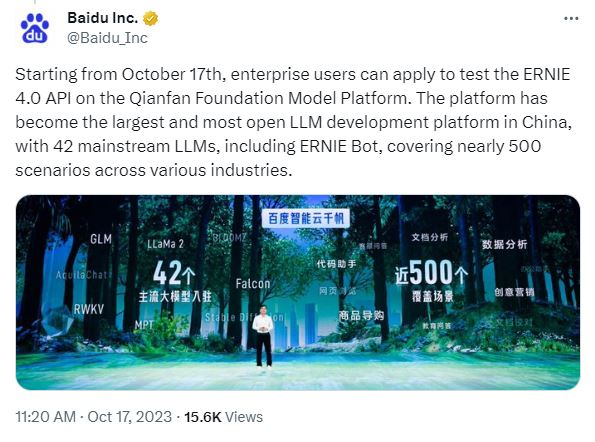
Qianfan has now become China’s largest, most inclusive foundation model development platform.
Baidu can make China a leader in AI
The innovations announced by Baidu showcase the potential Chinese tech companies can have in AI. Despite tech restrictions by the Chinese government itself and sanctions by the US, Baidu and other Chinese tech companies continue to surprise the world with their innovations in AI.
Apart from Baidu, other Chinese tech companies like Alibaba and Huawei have also committed to focus on developing AI and help China achieve its ambition of becoming a leader in the technology by 2030.
Adding to the new updates, Dr. Dou Shen, executive vice president of Baidu and general manager of AI Cloud Group, announced a full upgrade of Baidu AI Cloud’s strategy, aiming to provide infrastructure such as the Baidu Qianfan Foundation Model Platform to empower enterprise customers in the development of low-threshold AI application and foundation models.
While it is uncertain how copyright, privacy and data security will be managed with these new updates, China is known for having some of the strictest regulations around. As such, businesses would most likely be confident in using these innovations as compared to those provided by foreign tech companies.
That being so, Jackson He, senior corporate vice president of Baidu and general manager of the Mobile Ecosystem Group, outlined a future where Baidu’s mobile ecosystem, linking billions of users and millions of ecosystem partners, will stand at the cutting-edge of developing and introducing AI-native applications.
Apart from all these, Baidu already possesses the world’s largest autonomous driving ride service platform, Apollo Go, with cumulative rides provided to the public reaching more than 4 million. The driverless robotaxi currently has a fleet operating in Beijing, Wuhan, Chongqing, Shanghai, and Shenzhen.
“China possesses rich resources in terms of AI application scenarios, as well as a wealth of users who are passionate about embracing new technologies. Now, with the emergence of advanced foundation models, I am confident that we can build a thriving AI ecosystem and create a new round of economic growth together,” concluded Li.
READ MORE
- Data Strategies That Dictate Legacy Overhaul Methods for Established Banks
- Securing Data: A Guide to Navigating Australian Privacy Regulations
- Ethical Threads: Transforming Fashion with Trust and Transparency
- Top 5 Drivers Shaping IT Budgets This Financial Year
- Beyond Connectivity: How Wireless Site Surveys Enhance Tomorrow’s Business Network

